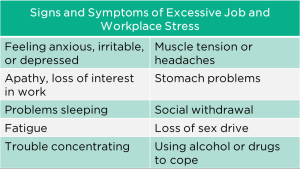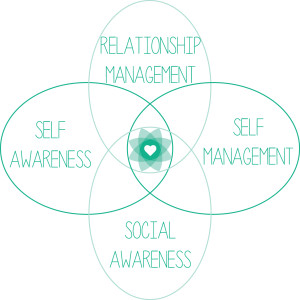Your Guide to Reducing Stress at Work

Stress at work is often times unavoidable, but too much stress can cause you and others to feel like you are on an emotional rollercoaster and impact your physical and emotional health. You can’t control everything, but there many ways that you can manage workplace stress that will help both you and everyone around you—and they are easy! Read on to see just how easy it can be.
 1. Recognize the warning signs of excessive stress at work. When you are overwhelmed at work, you may become irritable and withdrawn, causing you to be less productive and feeling as though your work is less rewarding, therefore making you feel stressed. It is important to recognize the warning signs in the chart to the right. If ignored, they can lead to larger physical and emotional problems.
1. Recognize the warning signs of excessive stress at work. When you are overwhelmed at work, you may become irritable and withdrawn, causing you to be less productive and feeling as though your work is less rewarding, therefore making you feel stressed. It is important to recognize the warning signs in the chart to the right. If ignored, they can lead to larger physical and emotional problems.
2. Reduce job stress by taking care of yourself. When stress at work interferes with your personal life or adversely affects your health or your ability to perform your job, it’s time to take action. Even small changes can make a big impact. Start with regular exercise, even if it’s just walking; make healthy food choices that help get you through a stressful work day; drink alcohol in moderation and avoid nicotine altogether (these are good life choices at any time); and always make sure you are getting enough sleep.
3. Reduce job stress by prioritizing and organizing. When you are organized, you will feel in control of your day and will have more self-control in stressful situations. To better manage your time: create a balanced schedule, don’t overcommit yourself, try to leave earlier in the morning, and plan regular breaks. To better manage your tasks: prioritize tasks, break projects into small steps, delegate responsibility, and be willing to compromise.

The Four Major Components of Emotional Intelligence in the Workplace
4. Reduce job stress by improving emotional intelligence. Emotional intelligence is the ability to manage and use your emotions in a positive and constructive way by communicating with others in ways that draw people to you, overcome differences, repair wounded feelings, and diffuse tension and stress. The five key skills of emotional intelligence are: realizing when you are stressed; staying connected to your emotions; recognizing and effectively using nonverbal cues and body language; developing the ability to meet challenges with humor; and resolving conflict positively.
5. Reduce job stress by breaking bad habits. These habits can make job stress worse, and can be easily broken over time: resist perfectionism; clean up your act (i.e. messy desk, stop running late, unrealistic goals); flip your negative thinking into positives; and don’t try to control the uncontrollable.
6. Learn how managers or employers can reduce job stress. Managers can act as positive role models and small organizational changes can be made to help combat stress including improving communication, consulting your employees, and cultivating a friendly social climate.
In just six steps, you can improve your stress at work along with your relationships with coworkers. KVC Kentucky is challenging you to take it one step further and join us for the 2015 Bluegrass Wellness at Work Challenge this Spring! Compete against similar organizations across the Bluegrass to win the fitness challenge or to be recognized as one of the Healthiest Places to Work! More information on the program will be available soon, but contact KYMarketing@kvc.org to be notified when your organization can sign up.
Information in this article came from helpguide.org. Follow this link to view the full article on workplace stress.